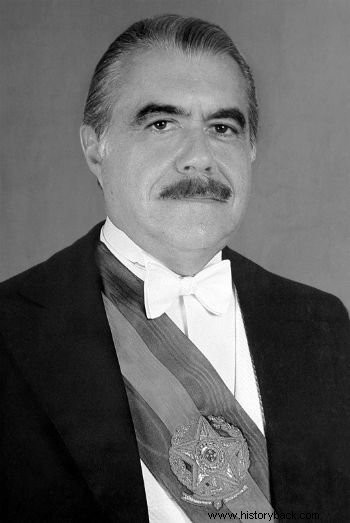José Sarney , a member of one of the richest families in Maranhão, is the politician with the longest political career in Brazil.
He participated in the country's redemocratization process as the 31st president of Brazil (1985-1990) and the first civilian president after the period of military dictatorship.
In addition, Sarney is a lawyer, writer and member of the Brazilian Academy of Letters (ABL), with a vast publication, including novels, short stories, chronicles and essays.
Biography of José Sarney
José Sarney de Araújo Costa was born in Pinheiro (MA), on April 24, 1930.
Son of judge Sarney de Araújo Costa and Kyola Ferreira de Araújo Costa. His first years of studies were in the countryside, where he attended primary school at Colégio Mota Júnior, in São Bento.
 José Sarney was the 31st president of Brazil
José Sarney was the 31st president of Brazil
At the age of 12, he entered Liceu Maranhense, in São Luís, where, at 14, he became President of the Centro Liceísta and editor of the newspaper “O Liceu”. In 1945, Sarney was arrested for taking part in the demonstrations against the Getúlio Vargas dictatorship.
In 1946, José Sarney meets Marly Macieira, with whom he married in July 1952, fathering children Roseana (1953), Fernando (1955) and José Sarney Filho (1957). In 1947, after winning one for best reporting, he is hired as a reporter.
In 1950, Sarney joined the Faculty of Law of Maranhão, where he graduated in Legal and Social Sciences in 1953.
The following year, he teaches at the Faculty of Social Work at the Catholic University of Maranhão. In 1955, he temporarily assumes the mandate of federal deputy in the Chamber of Deputies and abandons teaching.
Government of José Sarney
Elected federal deputy in 1959 by the National Democratic Union (UDN), a party in which he was vice president, José Sarney will oppose the government until 1964, when the military regime is installed. From then on, he supported the government forces by integrating the Arena party.
In turn, he is elected governor of Maranhão in 1965. He leaves office to run for the Senate, in which he is successful, remaining in office between 1970 and 1985.
In 1979, Sarney assumes the presidency of the Arena party, until the end of bipartisanship. With the creation of new political parties, José Sarney will preside over the Social Democratic Party (PDS), which he abandoned to create the Liberal Front, which will join the PMDB in 1984, launching the candidacy of President Tancredo Neves, of which he will be the vice president.
Tancredo, however, became seriously ill and Sarney assumed the presidency of the Republic on an interim basis on March 15, 1985.
In April 1985, with the death of Tancredo, José Sarney de Araújo Costa assumes the presidency of the republic and will have to deal with hyperinflation and the economic recession installed in Brazil.
Thus, under the auspices of the Minister of Finance, Dilson Funaro, the Cruzado Plan (1986) was launched to control inflation. At the same time, Sarney convenes a Constituent Assembly to draft the new Brazilian Constitution, promulgated in 1988.
In 1990, Sarney moved his electoral domicile to the state of Amapá, where he was elected senator. In 1995, he was elected president of the Senate for the first time. Now, in 1998 he is re-elected senator for Amapá and, in 2003, he was again chosen to head the Federal Senate.
He was elected senator of Amapá again in 2006, a position he holds to this day. He was also re-elected Senate President again in 2009 and 2011.
To learn more:Cruzado Plan
Literary Life
José Sarney de Araújo Costa is the author of a large number of works, especially those written for the press, such as his weekly chronicles for Folha de S. Paulo.
In 1953 he is admitted to the Academia Maranhense de Letras, which spread postmodernism in Maranhão.
He consecrated himself in July 1980, when he was chosen to occupy Chair nº 38 of the Brazilian Academy of Letters, of which he is the oldest member.
Main Works
- Poetry :The initial song (1954), Marimbondos de Fogo (1978) and Dead Saudades (2002).
- Novels :The owner of the sea (1995), Saraminda (2000), The Duchess is worth a mass (2007) and Maranhão - dreams and realities (2010).
- Chronicles :Friday, Folha (1994), The Liberal Wave at the Moment of Truth (1999), Canto de página (2002), Chronicles of Contemporary Brazil (2004), Semana Sim, Another Also (2006).
- Tales :North of the Waters (1969) and Ten Chosen Tales (1985)
Read more:Fernando Henrique Cardoso
